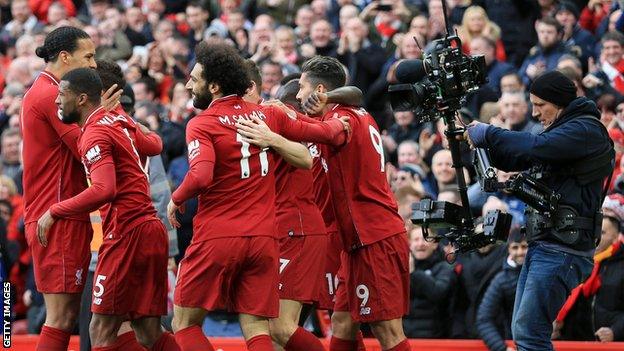Fifa, Uefa & Premier League lead anti-piracy call on Saudi company
- Published

Qatari company beIn Sports have the rights to show Premier League matches in the region
Football's leaders have called on Saudi Arabia satellite operators to stop "providing a platform for piracy".
Broadcaster beoutQ has been illegally showing matches - mainly in Saudi Arabia - despite the rights to show games in the region belonging to Qatari company beIN Sports.
Football authorities have attempted to shut the service down without success.
Now they have produced a report which they say proves Saudi-based company Arabsat is enabling beoutQ to operate.
The report, from brand protection firm MarkMonitor, was commissioned by football's world governing body Fifa, its confederations in Asia and Europe (AFC and Uefa), as well as major European leagues including the Premier League, Bundesliga, Serie A and La Liga.
"The report confirms without question that beoutQ's pirate broadcasts have been transmitted using satellite infrastructure owned and operated by Arabsat," the organisations said in a joint statement.
The bodies added that the piracy "harms not just legitimate licensees, fans and players but also the sports that it abuses".
Arabsat says it is the leading satellite services provider in the Arab world. The BBC has asked the company for comment.
It has always denied that beoutQ uses its frequencies to broadcast illegally and has accused beIN of being behind "defamation attempts and misleading campaigns".
Earlier this year, beIN Media Group director David Sugden told the BBC the beoutQ operation amounted to an "industrial scale theft".
Relations between Qatar and Saudi Arabia have been strained since June 2017, when many of Qatar's neighbours cut diplomatic ties with the country, accusing it of destabilising the region.
Analysis
BBC sports editor Dan Roan
This may seem like a complicated dispute between TV stations in two distant countries, born out of a wider diplomatic row in the Middle East - but it actually matters a great deal to British sport.
The huge sums Qatari broadcaster beIN Sports splashes out to show English football across the region is of critical importance to Premier League clubs, whose unprecedented wealth - and thus their spending power in the transfer market - is partly down to the sale of overseas TV rights to such companies.
But that depends on broadcasters being able to fend off cross-border piracy, and this case has exposed how there are limitations when it comes to preventing such activity in a country like Saudi Arabia, where bringing legal cases has proved difficult.
The worry for football (and other sports) is that beIN might run out of patience and walk away, taking its chequebook with it. The hope from many in the industry will be that this report heaps more pressure on Saudi broadcaster Arabsat to clamp down on beoutQ, although it has always robustly denied responsibility.
It certainly makes life a little awkward for Fifa president Gianni Infantino, who previously pushed for Saudi Arabia to host some matches in an expanded 2022 World Cup, and is known to be close to the Crown Prince, but who is now expected to get tough with the country.
BeIN Sports insists it is the victim of theft, but it is no stranger to controversy itself. The network's boss Nasser Al-Khelaifi, president of Paris St-Germain football club, has been investigated in France over Qatari bids to host the World Athletics Championships, and questioned in Switzerland in relation to a bribery investigation linked to beIN Sports' deal with Fifa for World Cup rights in 2026 and 2030. He denies any wrongdoing.